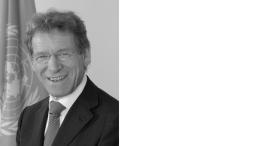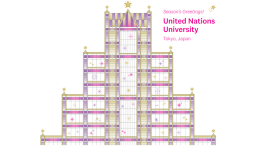Manama, Bahrain, 9 October 2025 — The United Nations University Institute for Water, Environment and Health (UNU-INWEH) and the Arabian Gulf University (AGU) celebrated the graduation of the tenth cohort from the Integrated Water Resources Management (IWRM) Diploma at the United Nations Water Learning Centre for the Arab Region (UN WLC) in Manama, Bahrain. This milestone highlighted a decade of successful capacity development, equipping water professionals from Arab nations with transdisciplinary solutions to tackle acute water scarcity and climate-related challenges.
Hosted by the AGU and established in 2007 through an Agreement of Cooperation between UNU-INWEH and AGU, the UN WLC serves as a regional hub for education and capacity development in integrated water resources management across the Arab region. The Centre’s creation was made possible through the support of the Arab Fund for Economic and Social Development. It offers the UNU-INWEH's IWRM Diploma programme comprising ten courses (250 hours of instruction) designed by the University of Waterloo, Canada, and adapted to the Arab regional context. The professional diploma, delivered in a mixed-mode system, allows working professionals to focus on real-world challenges while advancing their careers. Since its inception, the programme has graduated 141 professionals from across the Arab region, fostering the next generation of water leaders.
“The Arabian Gulf University is immensely proud to host the UN Water Learning Center for nearly two decades,” said Dr. Saad bin Saud Al Fuhaid, President of Arabian Gulf University, in his speech at the graduation event. “This enduring partnership has firmly established AGU as a regional center of excellence, training the essential human capital required to manage the Gulf’s precious and scarce water resources sustainably.”
This year, 19 participants representing ten Arab countries—Bahrain, Saudi Arabia, Kuwait, Oman, Jordan, Palestine, Syria, Sudan, Egypt, and Yemen—successfully completed the programme and received their diploma. Their applied research projects addressed key regional water challenges and offered innovative, practical solutions rooted in IWRM principles. Projects included: developing a drinking-water safety plan in Sudan; assessing wastewater-treatment performance in Kuwait; conducting an economic evaluation of constructed wetlands in Egypt; exploring sustainable brine-management strategies in Bahrain; and evaluating non-revenue water reduction efforts in Oman, among others.
“This diploma is not merely a certificate; it is a mandate for leadership in a world defined by climate complexity and severe water stress,”, said Dr. Mir Matin, Manager of the Geospatial, Climate and Infrastructure Analytics Program of UNU-INWEH, who attended the graduation ceremony on behalf of UNU-INWEH. “The work done here at the UN Water Learning Center is central to UNU-INWEH's commitment to capacity building in the Global South, transforming knowledge into actionable, equity-focused solutions for water security.”
UNU-INWEH's collaborative efforts with AGU and its partners across the globe constitute a powerful model for bridging the science-policy gap, especially in the Global Soth. The IWRM diploma ensures that localized, evidence-based research immediately informs regional development strategies and advances SDG implementation.
Prof. Waleed Khalil Zubari, Coordinator of the UN WLC and Dean of the Graduate College of Education, Administrative and Technological Studies attributed the strength of this professional diploma to its tailored curriculum, which integrates technical expertise with governance, economic, and environmental aspects. “We see the direct impact through our graduates, who return to their organizations ready to implement integrated, actionable projects to solve their nation's water challenges.”
Through its collaboration with the AGU, UNU-INWEH continues to contribute to the development of skilled professionals capable of designing and implementing sustainable water management solutions across the Arab region, building a growing network of IWRM leaders equipped to tackle pressing water challenges. This tenth cohort of the UN WLC graduates reflected remarkable diversity and collaboration across Arab countries. The graduates applied Integrated Water Resources Management principles to real-world challenges in their home countries, and their work demonstrated the potential to make a lasting impact on water security, climate resilience, and equitable access to water resources across the region.
“We are thankful for the steadfast support of the Government of Bahrain, the Government of Canada, its host country, and the Government of Japan for their continuous commitment to the UN University system. We invite all graduates and partners to join us in amplifying the science-policy interface, empowering the next generation of water leaders, and driving the global agenda on water, environment, and health toward the 2030 Agenda for Sustainable Development,” said Professor Kaveh Madani, Director of UNU-INWEH.
About UNU-INWEH: The United Nations University Institute for Water, Environment and Health (UNU-INWEH) address critical global challenges at the intersection of water, environment, climate change, agriculture, and health. Through research, capacity development, policy engagement, and knowledge dissemination, the Institute bridges the gap between scientific evidence and the practical needs of policymakers and UN Member States, with particular attention to the Global South. Headquartered in Canada, UNU-INWEH works with a diverse range of partners, including UN agencies, governments, academia, the private sector, and civil society, to develop solutions that advance human security, resilience, and sustainability worldwide.
About the UN Water Learning Center (UN WLC): The UN Water Learning Center (UN WLC) hosted by the Arabian Gulf University (AGU) formally established by an Agreement of Cooperation signed in 2007. The Center's primary purpose is to improve water resources management and services in the Arab Region by offering a professional Diploma in Integrated Water Resources Management (IWRM).



